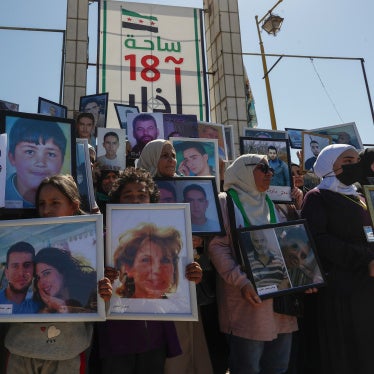Human Rights Watch called today for the immediate arrest and prosecution of Iraqi General Ali Hassan al-Majid, the architect of the 1988 genocidal "Anfal" campaign against the Iraqi Kurds, who is currently traveling through the Middle East.
General al-Majid arrived in Damascus, Syria, today for talks with President Bashar al-Assad, reportedly as part of efforts to avert a possible war against Iraq. According to press reports, he may also visit Egypt, Jordan and Lebanon in the coming days.
Al-Majid commanded Iraq's notorious "Anfal" campaign, which resulted in the murder and "disappearance" of some 100,000 Kurds and was marked by the use of chemical weapons, according to a Human Rights Watch book on that campaign, Genocide In Iraq: The Anfal Campaign Against the Kurds.Al-Majid is widely known in Iraq as "Chemical Ali" for his repeated use of outlawed chemical warfare. He was later in charge of Iraq's brutal military occupation of Kuwait.
"Al-Majid is Saddam Hussein's hatchet man. He has been involved in some of Iraq's worst crimes -- including genocide and crimes against humanity," said Kenneth Roth, executive director of Human Rights Watch. "Bringing him to justice is an essential priority."
Who is Ali Hassan al-Majid?
Ali Hassan al-Majid, as secretary general of the Northern Bureau of Iraq's Ba'th Party, held authority over all agencies of the state in the Kurdish region from March 1987 to April 1989, including the 1st and 5th Corps of the army, the General Security Directorate, and Military Intelligence. This included the period of the "Anfal" genocide against the region's Kurdish residents. One of his orders, dated June 20, 1987, directed army commanders "to carry out special bombardments [a reference to chemical weapon use]...to kill the largest number of persons present in...prohibited zones."
Named after a Koranic verse, justifying pillage of properties of infidels, the "Anfal" campaign unfolded as the 1980-1988 Iran/Iraq war was winding down. The Anfal campaign, under al-Majid's command, resulted in the murder and "disappearance" of some 100,000 noncombatants, the use of chemical weapons against non-combatants in dozens of locations, and the near-total destruction of family and community assets, including agricultural and other infrastructure, throughout the rural Kurdish areas. Documents captured from Iraqi intelligence services demonstrate that the mass killings, "disappearances," forced displacement, and other crimes were carried out in a coherent and highly centralized manner under al-Majid's direct supervision. Ali Hassan al-Majid was subsequently in charge of Iraq's military occupation of Kuwait and led forces that suppressed the popular uprising in the south of the country in March 1991. All of these campaigns were marked by executions, arbitrary arrests, "disappearances," torture and other atrocities.
"Chemical Ali posing as a peace envoy is like Bosnian Serb war criminal Ratko Mladic lecturing on human rights," said Roth. "He should be received by prison guards, not heads of state."
According to Iraqi opposition activists and refugee testimony, al-Majid also played a leading role in the campaign against Iraq's Marsh Arab population in the 1990s, a campaign that included the systematic bombardment of villages, torture, "disappearances," forced displacement, which reduced a community that once numbered over a quarter of a million people to less than 40,000 today.
"Chemical Ali" in his own Words
According to a 1988 audiotape of a meeting of leading Iraqi officials published by Human Rights Watch, al-Majid vowed to use chemical weapons against the Kurds, saying:
"I will kill them all with chemical weapons! Who is going to say anything? The international community? Fuck them! the international community, and those who listen to them!
"I will not attack them with chemicals just one day, but I will continue to attack them with chemicals for fifteen days."
The Legal Basis for a Prosecution
According to the United Nations Convention against Torture and Other Cruel, Inhuman or Degrading Treatment or Punishment, to which Egypt, Jordan and Lebanon are state parties, these government are under an international legal obligation to prosecute -- or to extradite for prosecution -- persons on its territory accused of torture, no matter where the torture was committed. Similarly, under the United Nations Convention on the Prevention and Punishment of the Crime of Genocide, which Egypt, Jordan, Lebanon and Syria have ratified, these governments undertook to prevent and to punish acts of genocide. Finally, all four countries have ratified the Geneva Conventions, which prescribes that states parties must search for persons alleged to have committed war crimes, and bring such persons, regardless of their nationality, before their own courts.








